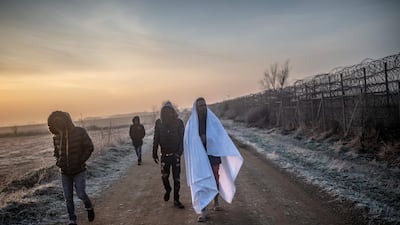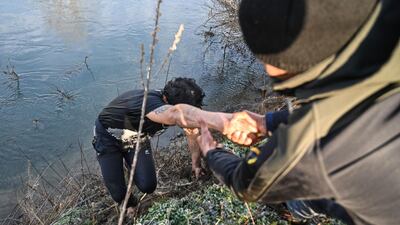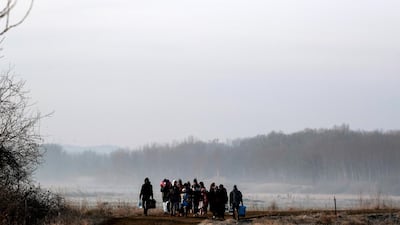Greece's Prime Minister, Kyriakos Mitsotakis, increased border security levels to maximum on Sunday after Turkey's abrupt decision to reduce restrictions for refugees and migrants hoping to cross into the EU.
By Saturday night, at least 13,000 people had gathered on Turkey’s border with Greece.
The UN's migration organisation said on Sunday that buses were being loaded with people overnight in Turkish cities to take people to the border.
Police said at least 500 people had arrived by sea on three Greek islands close to the Turkish coast within a few hours on Sunday morning.
"Our national security council has taken the decision to increase the level of deterrence at our borders to the maximum," Mr Mitsotakis tweeted on Sunday evening.
"As of now we will not be accepting any new asylum applications for one month.
"The borders of Greece are the external borders of Europe. We will protect them. I will be visiting the Evros land border with Turkey along with [European Council President] Charles Michel on Tuesday.
"Once more, do not attempt to enter Greece illegally. You will be turned back."
The UN High Commission for Refugees called for "calm and easing of tensions on the border".
"While states have a legitimate right to control their borders and manage irregular movements, they should refrain from the use of excessive and disproportionate force and establish a system to seek asylum in an orderly manner," UNHCR spokesman Babar Baloch said.
Many Syrians living in Turkey have seized the opportunity, afraid that the sudden window to leave the country will soon be closed.
The move came after a military escalation in north-west Syria on Thursday, where fighting has forced about 950,000 Syrian civilians to flee amid continuing hostility between Russian-supported regime forces and the Turkey-backed opposition.
Mass displacement in Idlib province has increased the likelihood that Turkey may come under mounting international pressure to open its sealed border with Syria and provide refuge to desperate civilians fleeing the violence.
Turkey hosts about 3.5 million Syrian refugees and has repeated that it cannot handle any more.
Turkish Interior Minister Suleyman Soylu claimed on Twitter that 76,358 people had left Turkey by Sunday morning through Edirne province, which borders Greece and Bulgaria. The claim has not been verified.
Greece and Bulgaria have insisted that people will not be allowed to enter.
Greek police fired tear gas and stun grenades to push back crowds as people tried to find a way through. Bulgaria sent an extra 1,000 troops to its border with Turkey.
Greek deputy defence minister Alkiviadis Stefanis told local broadcaster Skai there were about 9,600 attempts to illegally cross Greece’s border over the course of Saturday night. All were thwarted, he said.
On Friday night, temperatures were near-freezing and it rained heavily.
One group of Afghans travelling with young children waded across the Evros river and sheltered in a small chapel before progressing into Greece on Friday morning.
"Today is good," Shir Agha, 30, said in broken English. "Before, Erdogan people, police problem."
In recent years, the number of Afghans entering Turkey has increased.
Some groups tried to get through the border by cutting holes in the fence.
Greek officials said 66 people were arrested on Friday, 17 of whom were sentenced to more than three years in jail for illegal entry. Another 70 were arrested on Saturday. Several dozen people made it through.
Others tried the dangerous sea crossing from the Turkish coast to the Greek islands. At last three dinghies carrying people made it to the Greek island of Lesbos on Sunday morning.
Idlib, which is the last remaining rebel stronghold in Syria, has been under bombardment by Syrian President Bashar Al Assad’s forces since December.
Turkey retaliated by attacking government positions. On Sunday, Turkey's state-owned Anadolu Agency said that a Syrian government plane was shot down in north-west Idlib. Syrian state media denied the report and said the army had brought down a Turkish drone over the town of Saraqib.
Ankara has called for more international support after 34 Turkish soldiers were killed in air strikes by regime forces in Idlib on Thursday. The incident marked the highest number of Turkish troops killed since the start of the offensive.
On Saturday, Turkish President Recep Tayyip Erdogan said Ankara, which often threatens to reopen the migration routes from the Middle East to Europe, would not stand in the way of refugees and migrants already in the country who hoped to go west.
“We will not close the gates to refugees,” Mr Erdogan said. “The European Union has to keep its promises. We are not obliged to look after and feed so many refugees.”
Under a €6 billion (Dh24.30bn) deal in 2016, Turkey agreed to stem the tide of refugees to Europe in return for financial aid after more than a million people entered the continent in 2015.













